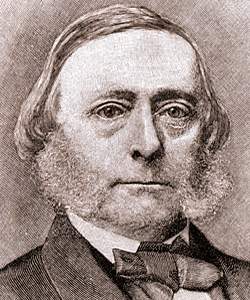Andrew Horatio Reeder (National Cyclopaedia)
Reference
REEDER, Andrew Horatio, first governor of Kansas territory (1854-55) was born at Easton, Pa., Jul. 12, 1807. He received an academical education at Lawrenceville, N. J., studied law, and entered upon professional practice in his native city. Here, after the customary vicissitudes of a young lawyer, he rose to a local eminence unsurpassed in eastern Pennsylvania. His political and business life was distinguished for energy, integrity and high intelligence, and as an ardent Democrat he was an active participant in its councils and campaigns previous to his appointment to the governorship of Kansas territory. He was not an applicant for the position and did not know that his name was under consideration until informed that Asa Packer and John W. Forney had interceded with the president on his behalf. When informed that Pres. Pierce had decided to tender him the appointment, he took the matter under advisement, and early in the fall of 1854 concluded to accept, setting out at once for Fort Leavenworth, the territorial capital. Gov. Reeder was supposed to be in sympathy with the administration, and in favor of extending slavery to Kansas territory, but his first public acts indicated that he was not prepared to use the power of his administration to this end. If his mind was not fully clear on this question, the lawlessness of the Missouri border ruffians satisfied him that the extension of slavery into Kansas would be a menace to civilization and leave a stain upon the fair name of the young territory whose destinies were for the time in his keeping. He, however, issued certificates for a sufficient number of the fraudulent election returns to allow the establishment of the pro-slavery convention on the ground that they were evidently correct in form and were not contested. Nevertheless, he showed himself entirely opposed to the policy of the pro-slavery party. As soon as his position was fully understood in Washington, the administration became dissatisfied, and after thirteen months of official life lie was removed from office. Jefferson Davis, then secretary of war, headed a delegation which demanded his removal from the president on the ground that he had engaged in various speculations and in the traffic of lots and lands in and near the various towns competing for the location of the territorial capitol. As a matter of fact he had owned but little land in the territory, had made no speculations whatever, and in all respects had been an upright man and honest executive. Gov. Reeder was not embarrassed by his removal from office. He felt that his cause was just, and he was endorsed by being nominated as the free-state candidate for delegate to congress. He received a majority of all the votes cast, but was never seated. A committee consisting of William A. Howard of Michigan, John Sherman of Ohio, and Mordecai Oliver of Missouri was appointed by the house of representatives to investigate the election, but the feeling in Kansas was so intense and the difficulty of securing evidence so great that the matter was not pursued. After a short stay in Kansas he made his way East, and, fearing mob violence at the hands of his pro-slavery enemies, traveled from Lawrence to Alton, Ill., disguised. In Alton, his presence occasioned the wildest enthusiasm, and at every town on the way he was detained, and crowds assembled to welcome him and promise protection from any attempt to return him to the territory. Arriving in Easton, he at once entered the campaign for John C. Fremont for president, and in 1860 he was a prominent candidate for vice-president before the national Republican convention. At the breaking out of the war he was appointed brigadier- general in the regular army by Pres. Lincoln, but declined. Gov. Reeder was married, in 1831, to Amelia Hutter of Easton, Pa. They had eight children. He died at Easton, Pa., Jul. 5, 1864.
"Reeder, Andrew Horatio,"The National Cyclopaedia of American Biography (New York: James T. White & Company, 1898), 8: 340.



